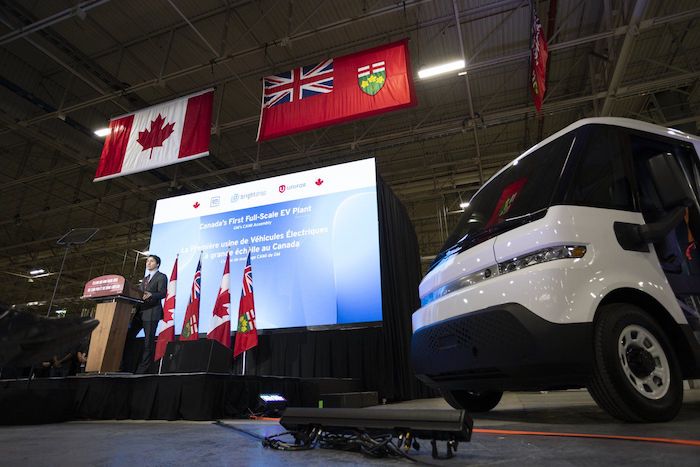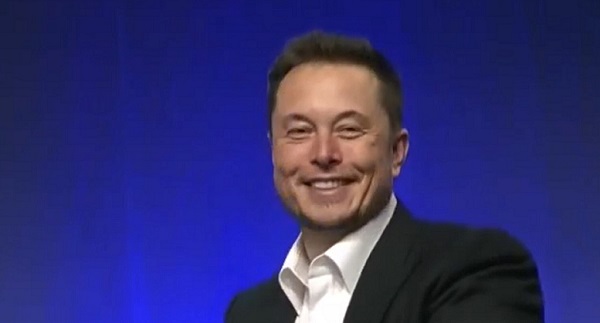Automotive
Many Gen Z and millennial Canadians don’t believe in EV corporate welfare

From the Fraser Institute
By Tegan Hill and Jake Fuss
The Parliamentary Budget Officer recently estimated federal government support for EV initiatives will cost Canadian taxpayers $31.4 billion, which represents roughly $1,043 per tax filer.
According to a new Leger poll, a significant percentage of Gen Z and millennial Canadians don’t believe that billions of dollars in government subsidies to build electric vehicle (EV) plants—including $5 billion to Honda, $13.2 billion to Volkswagen and $15 billion to Stellantis—will benefit them. And based on a large body of research, they’re right.
The poll, which surveyed Canadians aged 18 to 39 who are eligible to vote, found that only 32 per cent of respondents believe these subsidies (a.k.a. corporate welfare) will be of “significant benefit to your generation” while 28 per cent disagree and 25 per cent are on the fence.
Unfortunately, this type of taxpayer-funded corporate welfare isn’t new. The federal government spent an estimated $84.6 billion (adjusted for inflation) on business subsidies from 2007 to 2019, the last pre-COVID year of data. Over the same period, provincial and local governments spent another $302.9 billion on business subsidies for their favoured firms and industries. And these figures exclude other forms of government support such as loan guarantees, direct investments and regulatory privileges, so the actual cost of corporate welfare during this period was much higher.
The Trudeau government has shown a particular proclivity for corporate welfare. According to a recent study, federal subsidies have increased by 140 per cent from 2014/15 to 2023/24. But again, the money used to fund these subsidies isn’t free—its funded by taxpayers. The Parliamentary Budget Officer recently estimated federal government support for EV initiatives will cost Canadian taxpayers $31.4 billion, which represents roughly $1,043 per tax filer.
And Canadians are right to be skeptical. Despite what the Trudeau or provincial governments claim, there’s little to no evidence that corporate welfare creates jobs (on net) or produces widespread economic benefits.
Instead, by giving money to select firms, the government simply shifts jobs and investment away from other firms and industries—which are likely more productive, as they don’t require government funding to be economically viable—to the government’s preferred industries and firms, circumventing the preferences of consumers and investors. If Honda, Volkswagen and Stellantis are unwilling to build their EV battery plants in Canada without corporate welfare, that sends a strong signal that those projects make little economic sense.
Finally, higher taxes (or lower government spending in other areas) ultimately fund corporate welfare. And higher taxes depress economic activity—the higher the rates, the more economic activity is discouraged.
Unfortunately, the Trudeau government believes it knows better than investors and entrepreneurs, so it continues to use taxpayer money to allocate scarce resources—including labour—to their favoured projects and industries. And since politicians spend other people’s money, they have little incentive to be careful investors.
Canadians, including young Canadians, are right to be skeptical of corporate welfare. As the evidence suggests, there’s little reason to think it will lead to any economic benefit for them.
Authors:
Automotive
The high price of green virtue

By Jerome Gessaroli for Inside Policy
Reducing transportation emissions is a worthy goal, but policy must be guided by evidence, not ideology.
In the next few years, the average new vehicle in British Columbia could reach $80,000, not because of inflation, but largely because of provincial and federal climate policy. By forcing zero-emission-vehicle (ZEV) targets faster than the market can afford, both governments risk turning climate ambition into an affordability crisis.
EVs are part of the solution, but mandates that outpace market acceptance risk creating real-world challenges, ranging from cold-weather travel to sparse rural charging to the cost and inconvenience for drivers without home charging. As Victoria and Ottawa review their ZEV policies, the goal is to match ambition with evidence.
Introduced in 2019, BC’s mandate was meant to accelerate electrification and cut emissions from light-duty vehicles. In 2023, however, it became far more stringent, setting the most aggressive ZEV targets in North America. What began as a plan to boost ZEV adoption has now become policy orthodoxy. By 2030, automakers must ensure that 90 per cent of new light-duty vehicles sold in BC are zero-emission, regardless of what consumers want or can afford. The evidence suggests this approach is out of step with market realities.
The province isn’t alone in pursuing EV mandates, but its pace is unmatched. British Columbia, Quebec, and the federal government are the only ones in Canada with such rules. BC’s targets rise much faster than California’s, the jurisdiction that usually sets the bar on green-vehicle policy, though all have the same goal of making every new vehicle zero-emission by 2035.
According to Canadian Black Book, 2025 model EVs are about $17,800 more expensive than gas-powered vehicles. However, ever since Ottawa and BC removed EV purchase incentives, sales have fallen and have not yet recovered. Actual demand in BC sits near 16 per cent of new vehicle sales, well below the 26 per cent mandate for 2026. To close that gap, automakers may have to pay steep penalties or cut back on gas-vehicle sales to meet government goals.
The mandate also allows domestic automakers to meet their targets by purchasing credits from companies, such as Tesla, which hold surplus credits, transferring millions of dollars out of the country simply to comply with provincial rules. But even that workaround is not sustainable. As both federal and provincial mandates tighten, credit supplies will shrink and costs will rise, leaving automakers more likely to limit gas-vehicle sales.
It may be climate policy in intent, but in reality, it acts like a luxury tax on mobility. Higher new-vehicle prices are pushing consumers toward used cars, inflating second-hand prices, and keeping older, higher-emitting vehicles on the road longer. Lower-income and rural households are hit hardest, a perverse outcome for a policy meant to reduce emissions.
Infrastructure is another obstacle. Charging-station expansion and grid upgrades remain far behind what is needed to support mass electrification. Estimates suggest powering BC’s future EV fleet alone could require the electricity output of almost two additional Site C dams by 2040. In rural and northern regions, where distances are long and winters are harsh, drivers are understandably reluctant to switch. Beyond infrastructure, changing market and policy conditions now pose additional risks to Canada’s EV goals.
Major automakers have delayed or cancelled new EV models and battery-plant investments. The United States has scaled back or reversed federal and state EV targets and reoriented subsidies toward domestic manufacturing. These shifts are likely to slow EV model availability and investment across North America, pushing both British Columbia and Ottawa to reconsider how realistic their own targets are in more challenging market conditions.
Meanwhile, many Canadians are feeling the strain of record living costs. Recent polling by Abacus Data and Ipsos shows that most Canadians view rising living costs as the country’s most pressing challenge, with many saying the situation is worsening. In that climate, pressing ahead with aggressive mandates despite affordability concerns appears driven more by green ideology than by evidence. Consumers are not rejecting EVs. They are rejecting unrealistic timelines and unaffordable expectations.
Reducing transportation emissions is a worthy goal, but policy must be guided by evidence, not ideology. When targets become detached from real-world conditions, ideology replaces judgment. Pushing too hard risks backlash that can undo the very progress we are trying to achieve.
Neither British Columbia nor the federal government needs to abandon its clean-transportation objectives, but both need to adjust them. That means setting targets that match realistic adoption rates, as EVs become more affordable and capable, and allowing more flexible compliance based on emissions reductions rather than vehicle type. In simple terms, the goal should be cutting emissions, not forcing people to buy a specific type of car. These steps would align ambition with reality and ensure that environmental progress strengthens, rather than undermines, public trust.
With both Ottawa and Victoria reviewing their EV mandates, their next moves will show whether Canadian climate policy is driven by evidence or by ideology. Adjusting targets to reflect real-world affordability and adoption rates would signal pragmatism and strengthen public trust in the country’s clean-energy transition.
Jerome Gessaroli is a senior fellow at the Macdonald-Laurier Institute and leads the Sound Economic Policy Project at the BC Institute of British Columbia
Automotive
Elon Musk Poised To Become World’s First Trillionaire After Shareholder Vote


From the Daily Caller News Foundation
At Tesla’s Austin headquarters, investors backed Musk’s 12-step plan that ties his potential trillion-dollar payout to a series of aggressive financial and operational milestones, including raising the company’s valuation from roughly $1.4 trillion to $8.5 trillion and selling one million humanoid robots within a decade. Musk hailed the outcome as a turning point for Tesla’s future.
“What we’re about to embark upon is not merely a new chapter of the future of Tesla but a whole new book,” Musk said, as The New York Times reported.
Dear Readers:
As a nonprofit, we are dependent on the generosity of our readers.
Please consider making a small donation of any amount here.
Thank you!
The decision cements investor confidence in Musk’s “moonshot” management style and reinforces the belief that Tesla’s success depends heavily on its founder and his leadership.
Tesla Annual meeting starting now
https://t.co/j1KHf3k6ch— Elon Musk (@elonmusk) November 6, 2025
“Those who claim the plan is ‘too large’ ignore the scale of ambition that has historically defined Tesla’s trajectory,” the Florida State Board of Administration said in a securities filing describing why it voted for Mr. Musk’s pay plan. “A company that went from near bankruptcy to global leadership in E.V.s and clean energy under similar frameworks has earned the right to use incentive models that reward moonshot performance.”
Investors like Ark Invest CEO Cathie Wood defended Tesla’s decision, saying the plan aligns shareholder rewards with company performance.
“I do not understand why investors are voting against Elon’s pay package when they and their clients would benefit enormously if he and his incredible team meet such high goals,” Wood wrote on X.
Norway’s sovereign wealth fund, Norges Bank Investment Management — one of Tesla’s largest shareholders — broke ranks, however, and voted against the pay plan, saying that the package was excessive.
“While we appreciate the significant value created under Mr. Musk’s visionary role, we are concerned about the total size of the award, dilution, and lack of mitigation of key person risk,” the firm said.
The vote comes months after Musk wrapped up his short-lived government role under President Donald Trump. In February, Musk and his Department of Government Efficiency (DOGE) team sparked a firestorm when they announced plans to eliminate the U.S. Agency for International Development, drawing backlash from Democrats and prompting protests targeting Musk and his companies, including Tesla.
Back in May, Musk announced that his “scheduled time” leading DOGE had ended.
-

 Crime1 day ago
Crime1 day agoCBSA Bust Uncovers Mexican Cartel Network in Montreal High-Rise, Moving Hundreds Across Canada-U.S. Border
-

 Environment1 day ago
Environment1 day agoThe Myths We’re Told About Climate Change | Michael Shellenberger
-

 Energy2 days ago
Energy2 days agoIt should not take a crisis for Canada to develop the resources that make people and communities thrive.
-

 Dr John Campbell2 days ago
Dr John Campbell2 days agoCures for Cancer? A new study shows incredible results from cheap generic drug Fenbendazole
-

 Artificial Intelligence1 day ago
Artificial Intelligence1 day agoAI Faces Energy Problem With Only One Solution, Oil and Gas
-

 Health1 day ago
Health1 day agoLack of adequate health care pushing Canadians toward assisted suicide
-

 Alberta24 hours ago
Alberta24 hours agoATA Collect $72 Million in Dues But Couldn’t Pay Striking Teachers a Dime
-

 Media23 hours ago
Media23 hours agoBreaking News: the public actually expects journalists to determine the truth of statements they report










